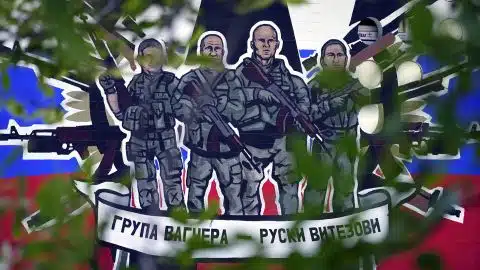The bodies of the Ukrainians lay side by side on the grass, the dirt beside them splayed out by a crater. The victims’ arms pointed to where they had died as they were dragged to Putin the place by Russian mercenaries.

“Let’s plant a grenade on them,” a husky Russian voice replies, implying a plan to booby-trap the bodies.
“There’s no need for a grenade; we’ll just bash them in,” one of the Ukrainian soldiers who had come to retrieve the victims said. The mercenaries then discover they have no ammunition left.
These incidents, were seen and heard exclusively on CNN battlefield footage, along with access to Wagner recruits fighting in Ukraine and honest, rare interviews with a former Wagner commander now seeking asylum in Europe, provide an unprecedented glimpse at the state of Russia’s finest mercenary organisation.
While supply and morale issues, as well as charges of war crimes, have been extensively reported among regular Russian troops, the prevalence of similar crises among Wagner mercenaries, dubbed President Vladimir Putin’s “off-the-books shock troops,” is a bad portent for Russia’s war in Ukraine.
In the Kremlin’s shadow
Wagner forces have gained international acclaim over many years. But, as Putin’s “special military operation” in Ukraine unravels, and the news of a “partial mobilisation” for desperately needed conscripts causes more than 200,000 Russian nationals to escape to neighbouring nations, the fractures in this ostensibly elite army begin to appear.
Wagner’s mandate, international footprint, and reputation have grown since its inception in 2014. Analysts believe it is a Kremlin-approved private military firm, and its fighters have fought in Ukraine since the Russian invasion in 2014, as well as in Syria, and in numerous African nations, including Sudan, Libya, Mozambique, Mali, and the Central African Republic.
Putin and Russia’s force :
Wagner private soldiers, who have a reputation in Russia as a loyal and useful force, have bolstered Moscow’s worldwide interests and military resources, which are already stretched fighting a war in Syria in favour of the Assad regime. According to CNN, their deployments have frequently been critical to Russian control of lucrative resources ranging from Sudanese gold to Syrian oil.
They mimic US Special Forces, flaunting contemporary equipment in recruiting videos, including heavy weapons and even helicopters.
Inadequate experience
More than seven months of warfare have exposed flaws in Russia’s military performance in Ukraine. Russia’s meagre achievements, especially in comparison to Putin’s early grandiose war goals, have come at a high cost, decimating frontline units and depriving many of key manpower and expertise.
One of two criteria is battlefield experience. According to ex-Wagner commander Gabidullin, who left the group in 2019 and has since authored a biography about his time working for them, one of the main differences between mercenaries and regular Russian military is money.
“The backbone of these groups was always very experienced guys who had already been through multiple conflicts,” he told CNN.
Also Read : Musk,suspends Twitter accounts of several journalist
Gabidullin returned to military life as a Wagner recruit following Russia’s 2014 invasion of eastern Ukraine, after serving as a junior officer with an airborne unit in the last days of the Soviet Union. He claimed that many senior Wagner people, including himself, may have previously served in Ukraine as well as Syria, acquiring significant battle expertise unavailable to most regular Russian troops.
“They have more significant experience than the army.” “The army is made up of young troops who were compelled to sign a contract and have no experience,” he explained.
It’s what makes Ukraine’s paramilitary forces, of which Wagner is one, so attractive to Russia.
According to Gabidullin, “the Russian army cannot handle [the battle] without mercenaries,” and that there is “a very huge lie, a very big deception about a robust Russian army.”
According to Andrii Yusov, a spokeswoman for Ukraine’s defence intelligence service who has been monitoring Wagner in Ukraine, at least 5,000 mercenaries linked to the Wagner gang are currently operating with Russian forces in Ukraine. A French intelligence source confirmed this amount, stating that some Wagner fighters had departed the African continent to support the group’s efforts in Ukraine.
According to Ukraine’s military ministry, the Kremlin has become more reliant on Wagner fighters as attack forces. They’ve borne a burden of casualties that has been politically problematic for Putin in Russia, hidden from official Russian death counts and accessible for deniable actions.
According to a senior US defence official speaking in September, “Wagner has been incurring high losses in Ukraine, notably and unsurprisingly among young and inexperienced fighters.”
According to Gabidullin, the use of Wagner troops is based on a simple equation: “Russian peace for American cash.”
Monthly earnings for mercenaries can reach $5,000.
Wagner fighters have also been assigned specific sectors of the front line, working virtually like normal army units, a sharp reversal from their history of specialised, limited duties in Ukraine.
Wagner, according to Yusov, is increasingly being deployed to fill gaps in the Russian front line. A senior US defence official verified this, adding that Wagner is being employed across many front lines, as opposed to Chechen fighters, who are concentrating on the Russian operation aiming at Bakhmut.
He claims that this has resulted in severe logistical issues, including as the necessity to equip Wagner forces with ammunition, food, and support for extended operations, all while Ukraine has increased its attacks on Russia’s supplies.
Shoes to be filled
Battlefield losses have also weakened Wagner’s ranks. As a result, they’ve turned to unusually open recruitment.
In Russia, billboards have appeared soliciting new Wagner recruits. Their tagline, “Orchestra ‘W’ Awaits You,” is adorned with a phone number and a picture of camouflage-clad fighters, and references to Wagner’s previous designation as the “orchestra.”












